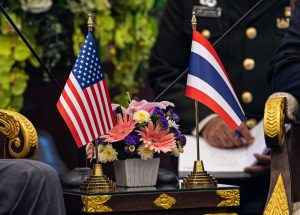Two United States senators have introduced a resolution expressing support for Thailand’s burgeoning pro-democracy movement, and calling on the U.S. government to do the same.
The bill, which was co-sponsored by Bob Menendez (D-NJ), the ranking member of the Senate Foreign Relations Committee, and Dick Durbin (D-IL), urges Thailand’s government “to protect and uphold democracy, human rights, the rule of law, and rights to freedom of peaceful assembly and freedom of expression.” It also calls for the authorities to “immediately and unconditionally release political activists and refrain from harassing, intimidating, or persecuting those engaged in peaceful protests.”
The resolution comes after a months of escalating protests in Bangkok and other Thai cities, which pitted a growing throng of youthful activists against the power of the Thai state. The protest movement is seeking the resignation of prime minister and former junta leader Prayut Chan-o-cha and the drafting of a new constitution. Activists have also aired combustive calls for the reform of the Thai monarchy and the reduction of the powers of King Vajiralongkorn, shattering a politically cultivated taboo that safeguards Thailand’s massive concentrations of wealth and power.
The Thai government has struggled to neutralize the protests. It has declared and then rescinded a special state of emergency designed to break up demonstrations. It has deployed water cannon and riot police against crowds. Most recently, it has revived the country’s notorious lese-majeste law in a bid to bring student leaders to heel, which Prayut promising to use “all laws and all articles to take action against demonstrators who break the law.” The continuing tensions have raised fears that the military may decide to stage another military coup in order to crush the protest movement.
The U.S. Senate resolution explicitly warned the Thai government against another military seizure of power, asserting that it “would be counter-productive and risk further undermining bilateral relations between the United States and Thailand.”
But the resolution, like many similar foreign policy emanations from the U.S. Congress, raises as many questions as it answers. On the one hand, it represents a welcome statement of support for the young protesters fighting for a greater degree of popular sovereignty. On the other hand, it seems to overreach slightly on its claim that the U.S. and Thailand are united by “shared values of democracy, rule of law, universal human rights, and a free market.”
While this claim of shared values is arguably true of a significant portion of the population, not least the thousands of young people who have taken to the streets in recent months, the history of the past half-century offers ample evidence that a significant section of Thailand’s military and royalist elite – to say nothing of the country’s big business conglomerates – has little real commitment to democratic accountability and human rights.
Indeed, the royalist vision of Thai society in many ways turns these ideas on their head. In its broad outlines, it is skeptical that ordinary Thai people have the “wisdom” to choose their own leaders, and asserts the necessity of rule by an arbitrary, anointed minority. During the Cold War, the U.S.-Thai alliance was forged in a mutual opposition to communism. The two nations were bound overwhelmingly by what they were against. Absent this shared external enemy, however, it is increasingly clear that the two governments have always had divergent ideas as to what they were for.
The logical corollary is that for the U.S. government to assert solidarity with and support for Thailand’s protest movement would at the very least create tensions with Bangkok, right at the moment when Washington is moving to consolidate ties with allies and partners in an attempt to curb China’s influence in Thailand and other neighboring countries. Beijing, of course, proclaims an amoral doctrine of “non-interference” in other countries’ affairs, which puts it in a handy position to capitalize on any U.S.-Thai frictions that might arise.
Herein lies the complication for Washington, as it seeks to reinvigorate its ties with the Thai government after a decade of lukewarm relations. One of the most challenging tasks for the incoming Biden administration will be to formulate a coherent approach for dealing with the non-democratic governments that dwell in China’s neighborhood, with whom it might share overlapping – but not wholly convergent – interests.
The victory of the pro-democracy movement and the creation of a genuinely democratic Thailand would render much of this debate moot – but it’s a risky bet to make, and, as the ascendancy of Aung San Suu Kyi’s National League for Democracy in Myanmar shows, not necessarily a salve for deeper structural problems. In the meantime, a failure to come up with a consistent strategy will lead to a continuation of the episodic strains and frictions that have dogged the U.S.-Thai relationship in recent years.

































